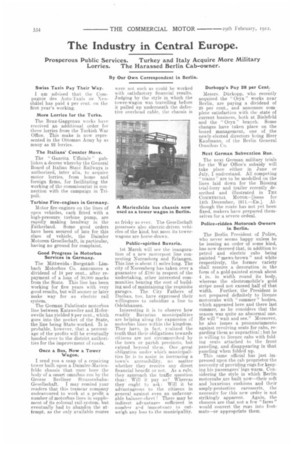The Industry in Central Europe.
Page 18

If you've noticed an error in this article please click here to report it so we can fix it.
Prosperous Public Services. Turkey and Italy Acquire More Military Lorries. The Harassed Berlin Cab-owner.
By Our Own Correspondent in Berlin.
Swiss Taxis Pay Their Way.
I am advised that. the Cornpagnie des Auto-Taxis de Neuch&tel has paid 4 per cent. on the first year's working.
More Lorries for the Turks.
The Benz-Gaggenau works have received an additional order for three lorries from the Turkish War Office. This make is now represented in the Ottoman Army by as many as 22 lorries.
The Italians Counter Move.
The " Gazetta Cffiziale " publishes a decree whereby the General Board of Italian State Railways is authorized, inter alia, to acquire motor lorries, from home and foreign firms, for facilitating the working of the commissariat in connection with the campaign in Tripoli.
Turbine Fire-engines in Germany.
Motor fire-engines on the lines of open vehicles, each fitted with a high-pressure turbine pump, are rapidly making headway in the Fatherland. Some good orders have been secured of late for this class of vehicle, the Daimler Motoren Gesellschaft, in particular, having no ground for complaint.
Good Progress in Motorbus Services in Germany.
The Mittweida Burgstadt Limbach Motorbus Co. announces a dividend of 18 per cent., after repayment of a loan of 30,000 marks from the State. This line has been working for five years with very good results, but will sooner or later make way for an electric rail system.
The German Palatinate motorbus line between Katzweiler and Hofersweile has yielded 9 per cent., which goes into the pocket of the State, the line being State-worked. It is probable, however. that a percentage of the profits will be eventually handed over to the district authorities for the improvement of roads.
Once a Bus, Now a Tower Wagon.
I send you a snap of a repairing tower built upon a Daimler-Marierifelde chassis that once bore the body of a smart omnibus run by the Grosse Berliner StrassenbahnGesellschaft. I may remind your readers that this tramcar company endeavoured to work at a profit a number of motorbus lines in supplement of its colossal rail-system, but eventually had to abandon the attempt, as the only available routes were not such as could be worked with satisfactory financial results. Judging by the style in which the tower-wagon was travelling before it pulled up underneath the defective overhead cable, the chassis is as frisky as ever. The Gesellschaft possesses also electric-driven vehicles of the kind, but most its towerwagons are horse-drawn.
Public-spirited Bavaria.
.1st March will see the inauguration of a new motorpost line connecting Nuremberg and Erlangen. This line is about 11 miles long. The city of Nuremberg has taken over a guarantee of £180 in respect of the undertaking, other interested communities bearing the cost of building and of maintaining the requisite garages. The City Fathers of Dachau, too, have expressed their willingness to subsidize a line to Odelzhausen.
Interesting it is to observe how readily Bavarian municipalities are helping along the expansion et motorbus lines within the kingdom. They have, in fast, rsalized the truth that their obligations towards citizens are not circumscribed by the town or parish precincts, but extend beyond them. One .great obligation under which municipalities lie is to assist in increasing a town's accessibility, no matter whether they receive any direct financial benefit or not. As a rule. they approach the traffic question thus : Will it pay us? Whereas they ought to ask Will it be advantageous to the citizens in general against even an unfavourable balance-sheet? There may be indirect advantages sufficient in nurribsr as,c1 importsnce to outweigh any loss to the municipality. Durkopp's Pay 28 per Cent.
Messrs. Diirkopp, who recently acquired the " Oryx " works near Berlin, are paying a dividend of 28 per cent., and announce complete satisfaction with the state of current business, both at Bielefeld and the " Oryx " branch. Some changes have taken place on the board management, one of the newly-elected directors bring Herr Kaufmann, of the Berlin General Omnibus Co.
Next German Subvention Run.
The next German military trials for the War Office's subsidy will take place either in June or July, I understand. All competing " trains " are to be modelled on the lines laid down for the Bussing trial-lorry and trailer recently described and illustrated in THE COMMERCIAL Moro—[issue for 14th December, 1911.—En.]. Although the route has not yet been fixed, makers have prepared themselves for a severe ordeal.
Police-ridden Motorcah Owners in Berlin.
The Berlin President of Police, who never seems happy unless. he be issuing an order of some ktnd, has now decreed that, in addition to petrol and electric cabs being painted " mews-brown " and white respectively, the former Variety shall receive a decoration in the form of a gold-painted streak about 4 in. in width round its body, whereas the electromobile's gold stripe need not exceed half of that width. Further, the President is not prepared definitely to licence motorcabs with "summer " bodies, which appeared here and there last summer, as he considers that the season was quite an abnormal one. He will "wait and see." Moreover, he also issues a pronunciamento against revolving seats for cabs, regarding them as unpractical ; but he is willing to licence cabs with folding seats attached to the front paneling, and disappeari-ng in that paneling when folded up.
This same official has just impressed upon the cab proprietor the necessity of providing rugs for keeping his passengers' legs warm. Considering the style in which Berlin motorcabs are built now—their soft and luxurious cushions and their amply-protective carossorie, the necessity for this new order is not strikingly apparent. Again, the chances are that not a few " fares " would convert the rugs into footmats—or appropriate them.






















